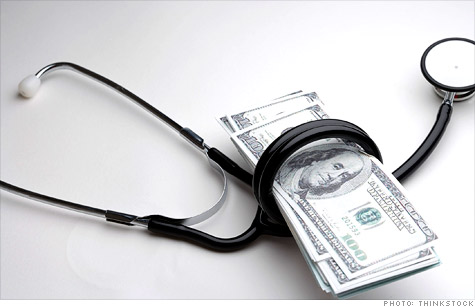Search News

Thanks to a provision in the health care reform law, millions of consumers will be receiving rebates from their insurers this summer.
NEW YORK (CNNMoney) -- Thanks to a provision in the health care reform law, millions of consumers will be receiving rebates from their insurers this summer.
By Aug. 1, insurers that failed to meet one of the early guidelines of the Affordable Care Act are going to issue rebates averaging $127 to certain policyholders, according to estimates from the Kaiser Family Foundation.
Last year, the Affordable Care Act started requiring health insurers to spend a certain percentage of the premium payments they receive toward patient care, such as doctor's visits and hospital stays, and quality improvement activities, including discounted gym memberships or wellness brochures, instead of things like administrative and marketing costs.
Under the law, large employer-sponsored plans must spend 85% of a policyholders' premiums this way, while insurance companies that cover individuals and small businesses have to spend at least 80%. If an insurer fails to meet that threshold, they must issue a refund.
Based on insurers' recent filings to the National Association of Insurance Commissioners, those rebates will total $1.3 billion altogether this year, according to Kaiser.
A large share of this money, or $426 million, will go to consumers who bought their own insurance through one of 215 plans. Nationwide, these consumers -- roughly 3.4 million people -- will each receive an average rebate of $127, Kaiser said in its report.
Most likely, they will receive a check in the mail, although the rebate could be issued as a discount on future premiums. Actual amounts will vary by insurer, by state and the extent to which the insurer fell below the threshold, Kaiser said.
In some states, like Alaska and Maryland, the average rebate is estimated to be near $300, while in New Mexico and Maine, the average rebate will be just $1 (not even enough for the insurer to issue a check).
Those insured through a private employer or a state or local government plan could see nothing at all. Those rebates will mostly go to the group policy holder, although the money could be passed on to employees who contributed a portion of their paycheck to their premium last year.
Kaiser calculated the averages based on insurers' early estimates. Actual rebates will be based on the reports the insurance companies submit to the federal government later this summer, Kaiser said. ![]()

Carlos Rodriguez is trying to rid himself of $15,000 in credit card debt, while paying his mortgage and saving for his son's college education.
| Overnight Avg Rate | Latest | Change | Last Week |
|---|---|---|---|
| 30 yr fixed | 3.80% | 3.88% | |
| 15 yr fixed | 3.20% | 3.23% | |
| 5/1 ARM | 3.84% | 3.88% | |
| 30 yr refi | 3.82% | 3.93% | |
| 15 yr refi | 3.20% | 3.23% |
Today's featured rates: